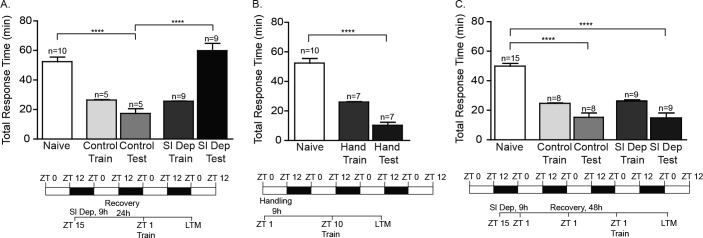Figure 4.
Sleep deprivation impairs long-term memory (LTM) for at least 24 h. To determine the persistence of sleep deprivation on LTM, animals were sleep deprived for 9 h and allowed to recover for 24 or 48 h prior to learning that food is inedible (LFI) training. No significant differences were observed between the training times for non-sleep deprived animals (Control Train) and sleep deprived animals (Sl Dep Train). (A) Animals were sleep deprived from ZT 15–ZT 24, allowed to recover for 24 h, and trained at ZT 1 the following day. Acute sleep deprivation inhibited LTM when animals were trained 24 hours after sleep deprivation. Trained sleep deprived animals (Sl Dep Test) had significantly longer total response times compared to trained non-sleep deprived animals (Control Test; one-way analysis of variance F(4,33) = 28.48, P < 0.0001). Numbers of animals in each group are shown above the columns. Asterisks represent Bonferroni post hoc analyses ****P < 0.0001. (B) Trained daytime-handled control animals (Hand Test) had shorter total response times during testing significantly different than naïve animals (one-way analysis of variance F(2,21) = 70.99, P < 0.0001). Asterisks represents Bonferroni post hoc analyses ****P < 0.0001 for testing between naïve and handled animals. (C) Forty-eight hours recovery time attenuated the effects of sleep deprivation as trained sleep deprived animals (Sl Dep Test) demonstrated LTM similar to trained non-sleep deprived animals (Control Test). Sleep deprived animals showed a significant decrease in response time when compared to naïve animals (one-way analysis of variance F(4,44) = 48.20, P < 0.0001). Asterisks represent Bonferroni post hoc analyses ****P < 0.0001.

